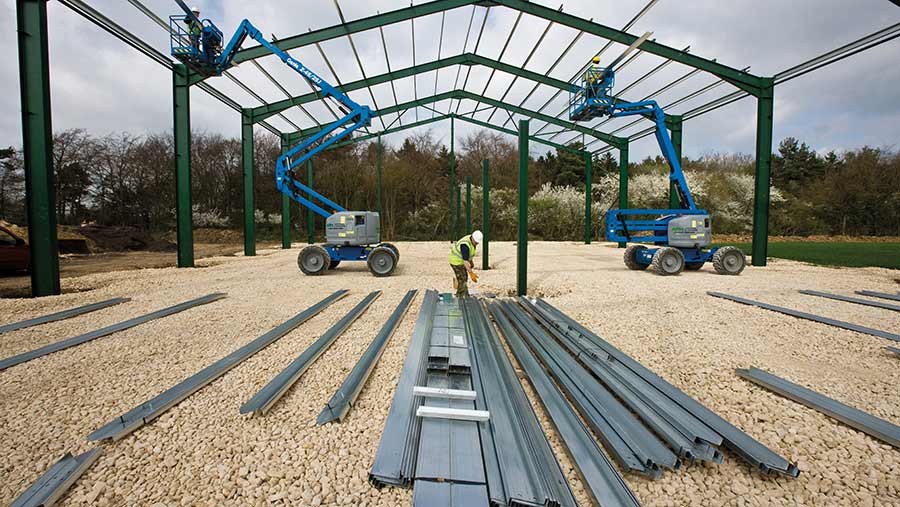Business Clinic: Who insures farm building projects?
 © Tim Scrivener
© Tim Scrivener Whether it’s a legal, tax, insurance, management or land issue, Farmers Weekly’s experts can help.
Ian Berry of insurance broker A-Plan Rural advises on cover for a farm building project.
See also: Business Clinic: Can I make a field entrance through hedge?
Q. We’re starting a big building project on the farm next spring to add a new parlour and cow housing complex. I’ve been told I should check on insurance, but I am not sure where to start – who covers what for such a project and what are my responsibilities?
A. Construction is a complicated business and there are risks, from the design phase through to construction and handover.
These include human factors (such as design failure, the construction process itself or workmanship), the farm environment and employees from different companies working in close proximity on site.
Losses or damage arising from these risks can run to millions of pounds worth of costs, so comprehensive insurance is critical. The necessary covers include:
- Contract works (works in progress and materials on site)
- Employers’ liability (claims brought by employees)
- Public liability (claims brought by members of the public)
- Hired-in plant (rented tools, machinery and other equipment)
- Professional indemnity (for professional advisers – it covers them for compensation payable for rectifying mistakes).
So, who is responsible for insuring the project?
Joint Contracts Tribunal (JCT)
Most commonly, the farmer (or employer) will commission an architect to design the building.
Check candidates have professional indemnity insurance and ask to see copies of the documentation. Share these with a lawyer, insurance broker and/or rural insurance company to verify it is fit for purpose.
See also: Business Clinic Webinar – advice on setting up a farm diversification
Once plans for the building are complete, farmers usually select a building company (or main contractor), who constructs the building, bringing in specialist subcontractors and professionals where necessary.
For a brand new building, normally it is the main contractor’s responsibility to insure the project, but do not rely on a verbal agreement on this – put the agreement in writing, no matter what the scale of the project.
Paperwork before building work
Before work commences, have a lawyer draft a building contract that stipulates who is responsible for insuring the works.
In the UK, the main building contract is the JCT. There are several types available, depending on the project, but the most used are the Standard Building Contract and Design and Build Contract.
Once agreed, the contract should identify the main contractor as responsible for insuring the project, which will include works undertaken by any subcontractors or professionals they employ.
However, check the main contractor has the appropriate cover in place with the necessary indemnity limits. Often, everything will be contained within a contract works policy.
Again, ask to see the documentation and send it to a lawyer, insurance broker and/or rural insurance provider for review. Do not begin works until insurance documentation has been approved by these parties and the JCT contract is agreed and signed.
If the building project includes work carried out on an existing structure with an existing value, then certain insurance responsibilities may fall solely or jointly (with the main contractor) to the farmer (or employer) named in the JCT.
When a project completes, the contractor will provide a certificate of final completion and the contract works policy will automatically terminate. At this point, be sure to arrange cover for the new building on a standard property owner’s policy. It can often be added to an existing farm policy.
Self-build construction projects
Sometimes, farmers may construct the building themselves, hiring in specialist tradespeople and equipment.
In these circumstances, it is their responsibility to identify, source and purchase the insurance policies needed.
Some farm insurance includes automatic contract works cover up to a certain limit, which covers works in progress and materials on site until completion on an all-risks basis.
However, this is a complex area, so consult an insurance broker and/or rural insurer as soon as possible to ensure the appropriate cover is in place before works begin and avoid delays. It is not always possible to obtain cover once works are under way.
Do you have a question for the panel?
Outline your legal, tax, finance, insurance or farm management question in no more than 350 words and Farmers Weekly will put it to a member of the panel. Please give as much information as possible.
Email your question to FW-Businessclinic@markallengroup.com using the subject line “Business Clinic”.
